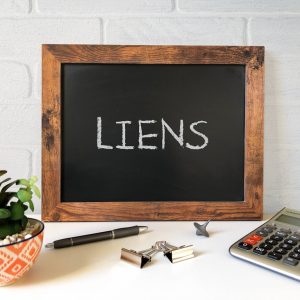
What is a Construction Lien?
A construction lien is a claim against real estate that is made by a contractor or a subcontractor for non-payment of services for construction or improvements to the property.
A construction lien on a property prevents the sale or refinance of a property due to the financial liability associated with the property. A lien can eventually lead to the property being forcibly sold to pay back the contractor for his services.
Claim of Lien
A claim of lien is made pursuant to Florida Statute 713.08. The claim of lien may be recorded at any time during the progress of the work or thereafter but not later than 90 days after the final furnishing of the labor or services or materials by the lienor.
A claim of lien must state the following:
(a) The name of the lienor and the address where notices or process under this part may be served on the lienor.
(b) The name of the person with whom the lienor contracted or by whom she or he was employed.
(c) The labor, services, or materials furnished and the contract price or value thereof. Materials specially fabricated at a place other than the site of the improvement for incorporation in the improvement but not so incorporated and the contract price or value thereof shall be separately stated in the claim of lien.
(d) A description of the real property sufficient for identification.
(e) The name of the owner.
(f) The time when the first and the last item of labor or service or materials was furnished.
(g) The amount unpaid the lienor for such labor or services or materials and for unpaid finance charges due under the lienor’s contract.
Discharge/Cancellation of a Lien
Discharge or cancellation of a lien is made pursuant to Florida Statute 713.21.
Pursuant to Section 713.21, Florida Statutes, a lien properly perfected may be discharged or released by any of the following methods:
(1) By entering satisfaction of the lien upon the margin of the record thereof in the clerk’s office when not otherwise prohibited by law. This satisfaction must be signed by the lienor or the lienor’s agent or attorney and attested by said clerk. Any person who executes a claim of lien has authority to execute a satisfaction in the absence of actual notice of lack of authority to any person relying on the same.
(2) By the satisfaction or release of the lienor, duly acknowledged and recorded in the clerk’s office. The satisfaction or release must include the lienor’s notarized signature and set forth the official records’ reference number and recording date affixed by the recording office on the subject lien. Any person who executes a claim of lien has authority to execute a satisfaction or release in the absence of actual notice of lack of authority to any person relying on the same.
(3) By failure to begin an action to enforce the lien within the time prescribed in this part.
(4) By an order of the circuit court of the county where the property is located, as provided in this subsection. Upon filing a complaint by any interested party the clerk shall issue a summons to the lienor to show cause within 20 days after service of the summons why his or her lien should not be enforced by action or vacated and canceled of record. Upon failure of the lienor to show cause why his or her lien should not be enforced or the lienor’s failure to commence such action before the return date of the summons the court shall order cancellation of the lien.
(5) By recording in the clerk’s office the original or a certified copy of a judgment or decree of a court of competent jurisdiction showing a final determination of the action.
Fraudulent Claim of Lien
In the case of a fraudulent lien, Section 713.31, Florida Statutes, provides a remedy:
Section 713.31(2)(c), Florida Statutes, states in pertinent part:
(c) An owner against whose interest in real property a fraudulent lien is filed, or any contractor, subcontractor, or sub-subcontractor who suffers damages as a result of the filing of the fraudulent lien, shall have a right of action for damages occasioned thereby. The action may be instituted independently of any other action, or in connection with a summons to show cause under s. 713.21, or as a counterclaim or cross-claim to any action to enforce or to determine the validity of the lien. The prevailing party in an action under this paragraph may recover reasonable attorney’s fees and costs. If the lienor who files a fraudulent lien is not the prevailing party, the lienor shall be liable to the owner or the defrauded party who prevails in an action under this subsection in damages, which shall include court costs, clerk’s fees, a reasonable attorney’s fee and costs for services in securing the discharge of the lien, the amount of any premium for a bond given to obtain the discharge of the lien, interest on any money deposited for the purpose of discharging the lien, and punitive damages in an amount not exceeding the difference between the amount claimed by the lienor to be due or to become due and the amount actually due or to become due.
Contact an Attorney
Attorney Karim Tabbaa of The Tabbaa Firm in Panama City, Florida can assist with prosecuting a claim of lien or with discharge and cancellation of a lien. Contact our office for a consultation, (850) 270-2000, or visit us online at www.tabbaafirm.com.
(Updated Oct 2023)
